In recent years, the skincare industry has witnessed a significant shift as consumers become more conscious about the ingredients in their beauty products.
The demand for natural and organic skincare products has surged, driven by a growing awareness of synthetic chemicals’ potential health and environmental impacts.
However, navigating the world of natural and organic skincare can be challenging, with numerous products claiming to be “natural” or “organic” without substantiating proof.
This is where certifications come into play. Natural and organic certifications provide a reliable way for consumers to identify products that meet stringent standards for ingredient purity, sustainability, and ethical sourcing.
These certifications ensure that products are free from harmful chemicals and synthetic additives and promote environmentally friendly practices in their production.
Understanding the various certifications available and what they signify is crucial for both consumers and skincare brands. For consumers, these certifications offer assurance of quality and transparency. For brands, obtaining these certifications can enhance credibility, foster consumer trust, and provide a competitive edge in a crowded market.
In this blog, we will delve into the world of natural and organic certifications, exploring what they mean for your skincare formulations. We will discuss the key certifications, the criteria they entail, the benefits they offer, and how they help in distinguishing truly natural and organic products from those merely capitalizing on the trend.
By the end of this blog, you’ll have a comprehensive understanding of how these certifications can impact your skincare choices and formulations.
Understanding Certifications
In today’s competitive cosmetic market, authenticity and trust are two critical factors that distinguish successful businesses from the competition. Obtaining cosmetic certificates is an important step towards accomplishing these goals. These certifications provide a standardised way to ensure that products meet specific criteria related to ingredient purity, ethical sourcing, environmental impact, and safety.
Understanding these certifications helps consumers make informed choices and allows brands to differentiate their products in a crowded marketplace. This also helps build your brand’s reputation and makes it easier to enter overseas markets with stringent regulatory standards.
What Are Certifications?
Certifications in the cosmetic industry are formal recognitions issued by independent, third-party organizations. They confirm that a product or its ingredients comply with specific standards set by the certifying body.
Purpose Of Certifications
- Consumer Assurance: Certifications assure consumers that the products they purchase meet rigorous safety and quality standards.
- Transparency: They ensure transparency in the sourcing, processing, and labelling of ingredients.
- Market Differentiation: Help brands stand out by demonstrating their commitment to higher standards.
- Sustainability: Promote environmentally sustainable and ethical practices within the industry.
Why do Natural And Organic Certifications Matter?
With a growing percentage of people turning to natural and organic cosmetics, the need for certified goods has never been greater.
Certifications serve as a sign of legitimacy, informing customers that the product they purchase is natural or organic. They verify that the product’s ingredients are sustainably sourced, devoid of dangerous chemicals and that the manufacturing method is environmentally sustainable.
Certifications clarify and boost consumer confidence in a sector where phrases like ‘natural’ and ‘organic’ are frequently thrown around.
Certifications’ Impact on Consumer Trust
Certifications contribute significantly to consumer trust. In a sector where misleading promises are frequent, approved cosmetics stand out as reliable choices. They guarantee the consumer that the product has undergone thorough testing and meets tight quality requirements.
Certifications can demonstrate a brand’s dedication to transparency and ethical procedures, which boosts consumer trust. A certified product also shows a brand’s dedication to sustainability and environmental responsibility, which are highly valued by modern consumers.
Difference Between Natural and Organic Certifications In Skincare
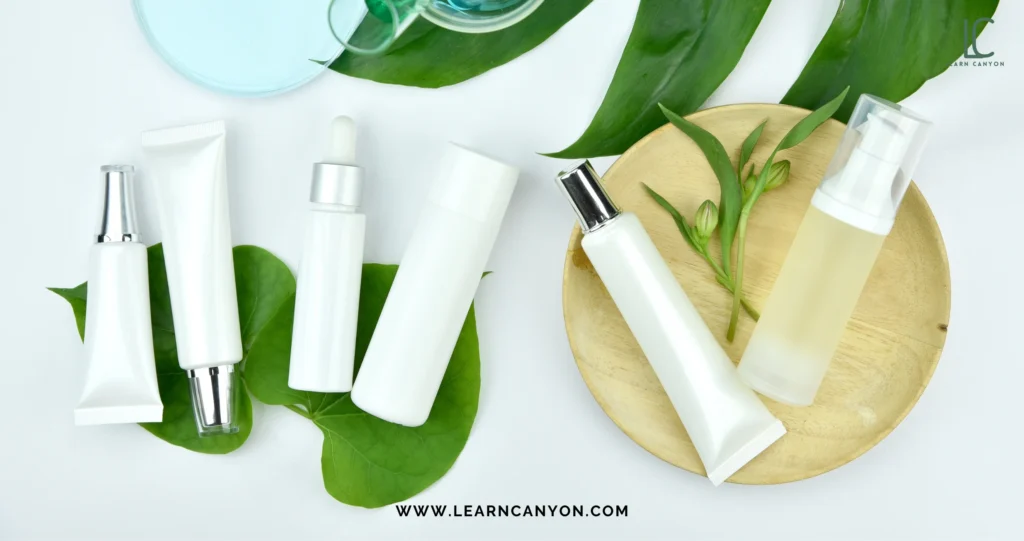
When navigating cosmetic products, understanding the difference between “natural” and “organic” certifications in skincare is crucial. These certifications though often used interchangeably, have distinct criteria and implications for product formulation, ingredient sourcing, and consumer trust.
- Definition and Criteria
Natural Certifications:
- Definition: Natural certifications are awarded to products primarily composed of natural ingredients, derived from natural sources without synthetic additives.
- Criteria:
- Ingredient Sourcing: Ingredients must be derived from natural sources such as plants, minerals, and marine origins.
- Processing: Limited use of synthetic processing methods. Emphasis on minimal processing to maintain the natural integrity of ingredients.
- Standards: This may allow a certain percentage of synthetic ingredients if they are proven safe and necessary for the formulation.
- Examples:
- NATRUE: Offers different levels of certification based on the percentage of natural ingredients.
- Ecocert Natural: Requires at least 95% of total ingredients to be natural or of natural origin.
Organic Certifications:
- Definition: Organic certifications are awarded to products that contain a high percentage of ingredients produced according to organic farming standards, without synthetic chemicals, pesticides, or GMOs.
- Criteria:
- Ingredient Sourcing: Ingredients must be grown and harvested according to organic farming practices, free from synthetic pesticides, fertilizers, and GMOs.
- Processing: Strict restrictions on the use of synthetic chemicals and processes in the manufacturing of organic products.
- Standards: Require a higher percentage of organic ingredients compared to natural certifications.
- Examples:
- USDA Organic: Requires products to contain 95-100% certified organic ingredients.
- COSMOS Organic: Requires a minimum percentage of organic content (20% for leave-on products, 10% for rinse-off products).
2. Labeling and Symbolism
Natural Certifications:
- Labelling: Products with natural certifications often use labels such as “natural” or “made with natural ingredients.” These labels indicate adherence to natural ingredient standards but do not necessarily mean organic.
- Symbolism: Certification logos like NATRUE and Ecocert Natural help consumers identify genuinely natural products.
Organic Certifications:
- Labeling: Products with organic certifications use labels such as “organic,” “certified organic,” or “made with organic ingredients.” These labels signify adherence to organic farming and processing standards.
- Symbolism: Certification logos like USDA Organic, COSMOS-standard, and Soil Association Organic ensure consumers that products meet strict organic standards.
3. Consumer Perception and Trust
Natural Certifications:
- Perception: Consumers may perceive natural products as safer and gentler due to the absence of synthetic chemicals.
- Trust: Natural certifications help build trust by verifying that products are made with predominantly natural ingredients and minimal synthetic additives.
Organic Certifications:
- Perception: Consumers often view organic products as the gold standard for purity, safety, and environmental sustainability.
- Trust: Organic certifications provide a higher level of trust by guaranteeing that ingredients are produced without synthetic chemicals, pesticides, and GMOs, and adhere to stringent organic farming practices.
4. Environmental and Ethical Implications
Natural Certifications:
- Environmental Impact: Focus on sustainable sourcing and minimal processing, which can reduce the environmental footprint.
- Ethical Practices: Encourage ethical sourcing and fair trade practices, but standards may vary between certifying bodies.
Organic Certifications:
- Environmental Impact: Emphasize environmentally sustainable farming practices, promoting soil health, biodiversity, and the reduction of chemical pollution.
- Ethical Practices: Often include stringent standards for ethical sourcing, fair trade, and humane treatment of workers, contributing to broader social and environmental benefits.
Types of Natural and Organic Certifications In Skincare Formulations
The skincare industry is rich with various certifications that ensure products meet high standards of natural and organic content, ethical sourcing, and environmental sustainability. Here are some of the most recognized certifications:
Key Natural Certifications
- NATRUE
- Criteria: NATRUE certification has three levels: Natural Cosmetics, Natural Cosmetics with Organic Portion, and Vegan skincare. Products must contain natural ingredients and have limited synthetic substances.
- Focus: Ensures products are free from synthetic fragrances, colourants, and preservatives.
- Symbol: NATRUE label indicating the level of certification.
- Ecocert Natural
- Criteria: Requires at least 95% of the total ingredients to be natural or of natural origin. Limited use of synthetic ingredients is allowed if they meet specific criteria.
- Focus: Promotes sustainable practices and environmentally friendly production.
- Symbol: Ecocert Natural Cosmetic logo.
- BDIH (Bund Deutscher Industrie- und Handelsunternehmen)
- Criteria: Natural ingredients, no synthetic fragrances or colourants, no animal testing, and environmentally friendly production methods.
- Focus: High standards for natural product integrity.
- Symbol: BDIH Certified Natural Cosmetics logo.
- USDA BioPreferred
- Criteria: Promotes the use of renewable agricultural materials and certifies products with a certain percentage of biobased content.
- Focus: Encourages the use of renewable resources.
- Symbol: USDA Certified Biobased Product label.
Key Organic Certifications
- USDA Organic
- Criteria: Products must contain 95-100% certified organic ingredients to bear the “organic” label. For “made with organic ingredients,” at least 70% must be organic.
- Focus: Strict standards for organic farming and processing.
- Symbol: USDA Organic seal.
- COSMOS-standard
- Categories:
- COSMOS Organic: Requires a minimum of 20% organic content for leave-on products (10% for rinse-off products).
- COSMOS Natural: Focuses on natural ingredients, but does not require a specific percentage of organic content.
- Criteria: Comprehensive standards covering ingredients, processing, and environmental impact.
- Symbol: COSMOS Organic or COSMOS Natural logo. (COSMOS-standard)
- Categories:
- Ecocert Organic
- Criteria: At least 95% of the total ingredients must be of natural origin, with a minimum percentage (usually 10%) of the total product being organic.
- Focus: Organic ingredients, sustainable practices, and environmental respect.
- Symbol: Ecocert Organic Cosmetic logo.
- Soil Association
- Criteria: At least 95% of the ingredients must be organic for the “organic” label. For “made with organic ingredients,” at least 70% must be organic.
- Focus: Organic and sustainable farming practices.
- Symbol: Soil Association organic logo.
- NSF/ANSI 305
- Criteria: Products must contain at least 70% organic ingredients and comply with specific processing and labelling standards.
- Focus: Rigorous organic standards for personal care products.
- Symbol: NSF Organic certification mark.
- Australian Certified Organic (ACO)
- Criteria: Products must meet the Australian National Standard for Organic and Biodynamic Produce, with at least 95% organic content for full organic certification.
- Focus: Organic farming and processing standards.
- Symbol: ACO Certified Organic logo.
Ethical and Environmental Certifications
- Leaping Bunny
- Criteria: Ensures products are cruelty-free, meaning no animal testing at any stage of product development.
- Focus: Ethical treatment of animals.
- Symbol: Leaping Bunny logo.
- Fair Trade Certified
- Criteria: Ensures fair wages, safe working conditions, and environmental sustainability in ingredient sourcing.
- Focus: Ethical and fair trade practices.
- Symbol: Fair Trade Certified logo.
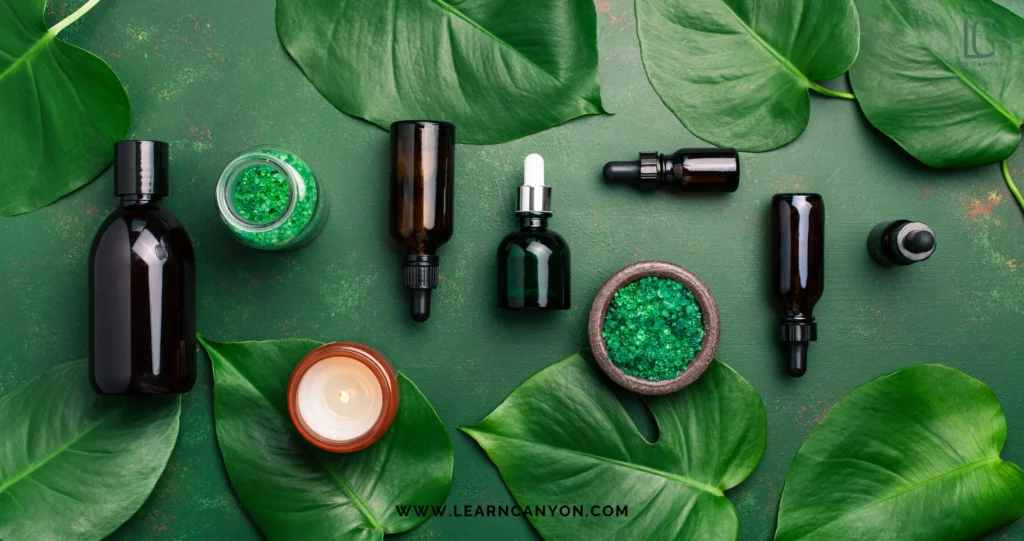
Compliance with Certification Bodies for Skincare Formulations
Compliance with certification bodies for skincare formulations involves adhering to strict guidelines and standards set by these organizations. This process ensures that the products meet the required criteria for being labelled as natural or organic. Here’s a detailed overview of what compliance entails for some of the most recognized certification bodies:
Natural Certifications
1. NATRUE Certification
- Ingredients:
- Natural Substances: Derived from plants, animals (e.g., honey), and minerals.
- Derived Natural Substances: Limited to approved substances that maintain the natural character of the ingredient.
- Nature-Identical Substances: Allowed only if natural substances are unavailable (e.g., certain minerals, preservatives).
- Processing:
- Minimal processing to maintain natural integrity.
- No synthetic fragrances, colourants, or preservatives.
- Product Levels:
- Natural Cosmetics: Basic natural ingredient requirements.
- Natural Cosmetics with Organic Portion: Contains some organic ingredients.
- Organic Cosmetics: Contains a significant percentage of organic ingredients.
- Packaging: Encouraged to use environmentally friendly and recyclable materials.
2. Ecocert Natural
- Ingredients:
- At least 95% of the total ingredients must be of natural origin.
- Limited and controlled use of synthetic ingredients.
- Processing:
- No GMOs, parabens, phenoxyethanol, nanoparticles, silicon, PEG, synthetic perfumes, or dyes.
- Use of environmentally friendly manufacturing processes.
- Packaging: Recyclable and biodegradable packaging is encouraged.
3. BDIH (Bund Deutscher Industrie- und Handelsunternehmen)
- Ingredients:
- Natural raw materials such as plant oils, fats, waxes, herbal extracts, essential oils, and aromatic materials.
- No synthetic dyes, fragrances, silicones, paraffins, or other petroleum products.
- Processing:
- Environmentally friendly production methods.
- No animal testing.
- Sourcing: Preference for organically grown raw materials.
Organic Certifications
1. USDA Organic
- Ingredients:
- 100% Organic: All ingredients must be certified organic.
- Organic: At least 95% of ingredients must be certified organic. The remaining 5% must be on the approved National List of allowed and prohibited substances.
- Made with Organic Ingredients: At least 70% of ingredients must be certified organic.
- Processing:
- No synthetic pesticides, fertilizers, GMOs, sewage sludge, synthetic preservatives, parabens, sulfates, or phthalates.
- Certification: Must be certified by a USDA-accredited certifying agent.
2. COSMOS-standard
- Categories:
- COSMOS Organic: Minimum 20% organic content for leave-on products and 10% for rinse-off products.
- COSMOS Natural: Focuses on natural ingredients without a specific percentage of organic content.
- Ingredients:
- No GMOs, parabens, phenoxyethanol, synthetic fragrances, colourants, or petrochemicals.
- Processing:
- Environmentally friendly processes.
- Packaging: Recyclable and minimized packaging.
3. Ecocert Organic
- Ingredients:
- At least 95% of the total ingredients must be of natural origin.
- At least 10% of the total product by weight must be organic.
- Processing:
- No synthetic fragrances, colourants, GMOs, parabens, phenoxyethanol, nanoparticles, silicon, PEG, synthetic perfumes, or dyes.
- Packaging: Must be biodegradable or recyclable.
4. Soil Association
- Ingredients:
- Organic: At least 95% organic ingredients.
- Made with Organic Ingredients: At least 70% organic ingredients.
- Processing:
- No synthetic chemicals, GMOs, or irradiation.
- Sourcing: Preference for sustainably sourced and fairly traded ingredients.
- Packaging: Encouraged to use environmentally responsible materials.
5. NSF/ANSI 305
- Ingredients:
- At least 70% of ingredients must be organic.
- The remaining 30% must meet strict standards and not be on the list of prohibited substances.
- Processing:
- No synthetic preservatives, parabens, or sulfates.
- Labeling: Must clearly state the percentage of organic content.
6. Australian Certified Organic (ACO)
- Ingredients:
- 100% Organic: All ingredients must be certified organic.
- Organic: At least 95% organic ingredients.
- Made with Organic Ingredients: At least 70% organic ingredients.
- Processing:
- No synthetic chemicals, GMOs, or irradiation.
- Sourcing: Emphasis on sustainable and ethical sourcing.
- Packaging: Must be environmentally friendly.
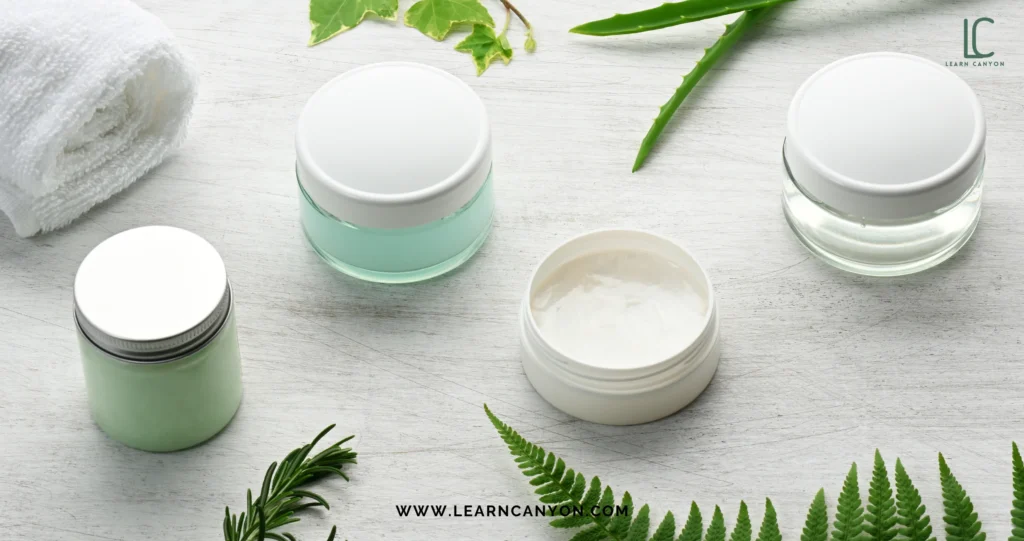
Benefits of Using Certified Natural and Organic Skincare Products
Certified natural and organic skincare products offer numerous advantages over conventional alternatives, not only for your skin but also for your overall health and the environment. Here are the key benefits:
1. Healthier Skin
- No Harsh Chemicals: Certified products are free from synthetic chemicals, parabens, sulfates, and artificial fragrances that can irritate the skin. This reduces the risk of allergic reactions, redness, and breakouts.
- Nutrient-Rich: These products often contain higher levels of beneficial nutrients like vitamins, antioxidants, and essential fatty acids that nourish and protect the skin.
- Gentle on Sensitive Skin: Natural and organic ingredients are generally gentler on the skin, making these products suitable for sensitive skin types and conditions like eczema and rosacea.
2. Safety and Purity
- No Toxic Ingredients: Certifications ensure that products are free from harmful substances such as pesticides, GMOs, and heavy metals, providing a safer option for your skin and health.
- Transparent Ingredients: Certified products must list all ingredients transparently, allowing consumers to choose what they apply to their skin.
3. Environmental Sustainability
- Eco-Friendly Production: Certified organic farming practices avoid synthetic pesticides and fertilizers, promoting soil health and biodiversity.
- Reduced Pollution: Natural and organic products typically use environmentally friendly production methods that reduce pollution and carbon footprints.
- Sustainable Sourcing: These products often prioritize sustainable and ethical sourcing of ingredients, supporting fair trade practices and preserving natural resources.
4. Ethical Considerations
- Cruelty-Free: Many certified natural and organic skincare products are not tested on animals, aligning with ethical consumer values.
- Fair Trade: Certifications often include standards for fair trade, ensuring fair wages and working conditions for farmers and workers involved in the production process.
5. Enhanced Efficacy
- High-Quality Ingredients: The stringent standards for certification ensure that products use high-quality, potent natural and organic ingredients that can be more effective in treating and maintaining skin health.
- Synergistic Cosmetic Formulations: Natural and organic products often use holistic skincare formulations where ingredients work synergistically to enhance overall efficacy.
To understand synergistic formulations you can check out our advanced organic skincare and haircare formulation courses available on our website that will give you clarity on certified organic components used in formulations and help you to develop various cosmetic products.
6. Supporting a Healthier Lifestyle
- Holistic Approach: Using certified products aligns with a holistic approach to health and wellness, promoting overall well-being and a healthier lifestyle.
- Mindful Consumption: Choosing these products encourages mindful consumption, where consumers consider the impact of their choices on their health, the environment, and society.
Challenges and Misconceptions
Despite the growing popularity of natural and organic skincare products, several misconceptions can deter consumers from making the switch. Let’s address some of the most common myths and provide clarity:
Misconception 1: Natural and Organic Products Are Not as Effective as Conventional Ones
Reality:
- High-Quality Ingredients: Certified natural and organic products often contain high-quality, potent ingredients that can be more effective in treating and maintaining skin health.
- Scientific Backing: Many natural ingredients, such as aloe vera, chamomile, and green tea, have been scientifically proven to provide significant skincare benefits.
- Synergistic Formulations: These products often use holistic formulations where natural ingredients work together to enhance overall efficacy.
Misconception 2: Natural and Organic Products Are Always Expensive
Reality:
- Wide Range of Options: While some premium natural and organic products can be costly, there is a wide range of affordable options available.
- Value for Money: Investing in high-quality skincare can save money in the long run by preventing and addressing skin issues more effectively.
- Cost-Effective Choices: Many brands offer cost-effective lines that are certified and still provide the benefits of natural and organic ingredients.
Misconception 3: Natural and Organic Products Have a Short Shelf Life
Reality:
- Natural Preservatives: Certified products often use natural preservatives like essential oils, vitamin E, and plant extracts that can extend shelf life without synthetic chemicals.
- Proper Storage: Following storage recommendations, such as keeping products in a cool, dark place, can help maintain their efficacy and longevity.
- Advances in Formulation: Innovations in natural preservation methods have significantly improved the shelf life of these products.
Misconception 4: Natural and Organic Products Are Not Safe for Sensitive Skin
Reality:
- Gentle Formulations: Many certified products are formulated specifically for sensitive skin and avoid harsh chemicals and irritants.
- Fewer Allergens: They are free from synthetic fragrances, dyes, and preservatives that often cause allergic reactions.
- Testing and Standards: Certifications ensure that products undergo rigorous testing for safety and efficacy, making them suitable for sensitive skin.
Misconception 5: All Natural and Organic Labels Mean the Same Thing
Reality:
- Different Standards: Not all natural and organic labels are created equal. Certified products meet specific, rigorous standards set by recognized certifying bodies, ensuring authenticity.
- Transparency: Certification labels provide transparency and assurance that the product meets high standards for natural and organic content.
- Certification Bodies: Recognized certifications include USDA Organic, COSMOS-standard, Ecocert, and NATRUE, each with its own set of criteria.
Misconception 6: Natural and Organic Products Lack Scientific Validation
Reality:
- Research and Development: Many natural and organic brands invest in research and development to scientifically validate the efficacy of their ingredients.
- Clinical Studies: Ingredients like hyaluronic acid, retinol, and peptides derived from natural sources have been extensively studied and proven effective.
- Evidence-Based: Certifications often require evidence-based proof of efficacy and safety before granting certification.
Challenges Faced by Skincare Brands in Obtaining and Maintaining Certifications
Achieving and maintaining natural and organic certifications for skincare products is a rigorous and complex process. Here are some of the key challenges that skincare brands face:
1. Stringent Certification Standards
- High Requirements: Certification bodies like USDA Organic, COSMOS-standard, and Ecocert have very stringent criteria. Brands must ensure that a significant percentage of their ingredients are certified organic or natural, which can be challenging to source and verify.
- Detailed Documentation: Brands must provide comprehensive documentation and evidence for every ingredient and process, which is time-consuming and resource-intensive.
2. Supply Chain Management
- Sourcing Quality Ingredients: Finding reliable suppliers who provide certified organic or natural raw materials can be difficult, especially in large quantities.
- Traceability: Ensuring the traceability of ingredients from farm to finished product is essential for certification but can be complex and costly.
- Seasonal Variations: The availability of certain natural ingredients can be affected by seasonal changes, impacting consistency and supply.
3. Cost Implications
- Higher Production Costs: Organic farming and sustainable practices often cost more than conventional methods, leading to higher raw material costs.
- Certification Fees: The certification process itself can be expensive. There are initial application fees, annual renewal fees, and costs associated with inspections and audits.
- Testing and Compliance: Regular testing and compliance checks to maintain certification add to ongoing operational costs.
4. Formulation Challenges
- Limited Ingredient Options: The range of allowable ingredients under natural and organic certifications is limited, which can restrict formulation options and creativity.
- Stability and Preservation: Formulating stable products with natural preservatives that meet certification standards can be challenging, especially for products with a longer shelf life.
- Performance Expectations: Meeting consumer expectations for product performance (e.g., texture, fragrance, efficacy) with natural ingredients can be more difficult than with synthetic alternatives.
5. Regulatory Variability
- Different Standards: Certification standards vary between different certifying bodies and regions, requiring brands to navigate and comply with multiple sets of rules if they wish to market their products globally.
- Changing Regulations: Regulations and standards can change, necessitating ongoing adjustments to formulations and processes to remain compliant.
Wrapping Up,
Navigating the world of natural and organic skincare certifications can seem complex, but the benefits and assurances they provide are invaluable. These certifications signify more than just a label; they represent a commitment to quality, safety, environmental sustainability, and ethical practices.
For consumers, certified natural and organic skincare products offer a promise of purity and efficacy, free from harmful chemicals and synthetic ingredients. They provide peace of mind that the products they use on their skin are made from high-quality, natural sources, and are produced in a manner that respects the environment and promotes sustainability. This is particularly crucial for individuals with sensitive skin or those looking to avoid allergens and toxins.
The journey to achieving natural and organic certifications requires careful selection of ingredients, adherence to strict processing standards, and a commitment to sustainability. While challenging, this process ensures that products not only meet regulatory standards but also uphold the highest principles of natural and ethical skincare.
Here at Learn Canyon, you can delve deep into the strategic skincare formulations we develop in our labs to help create effective cosmetics for different skin concerns which will also help you to understand both natural and organic certifications and how to utilise them for your skincare line.
Follow us for more on our webpage. Thanks for coming across this blog!
References
- https://www.cosmeticsdesign-europe.com/Article/2022/04/07/Natural-and-organic-cosmetic-certifications-and-standards-for-EU-beauty-industry
- https://wonnda.com/magazine/important-certifications-for-organic-cosmetics/
- https://www.ecocert.com/en-IN/certification-detail/natural-and-organic-cosmetics-cosmos
- https://blog.weareprovital.com/organic-and-natural-certifications-cosmetics/
- https://www.bointernational.net/blogs/what-are-the-top-certifications-required-for-skin-care-brands




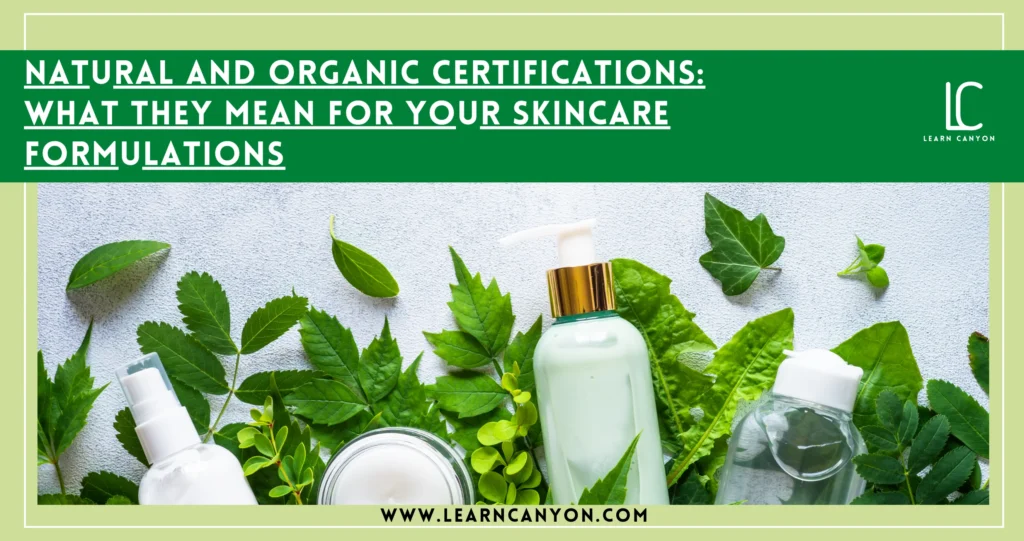

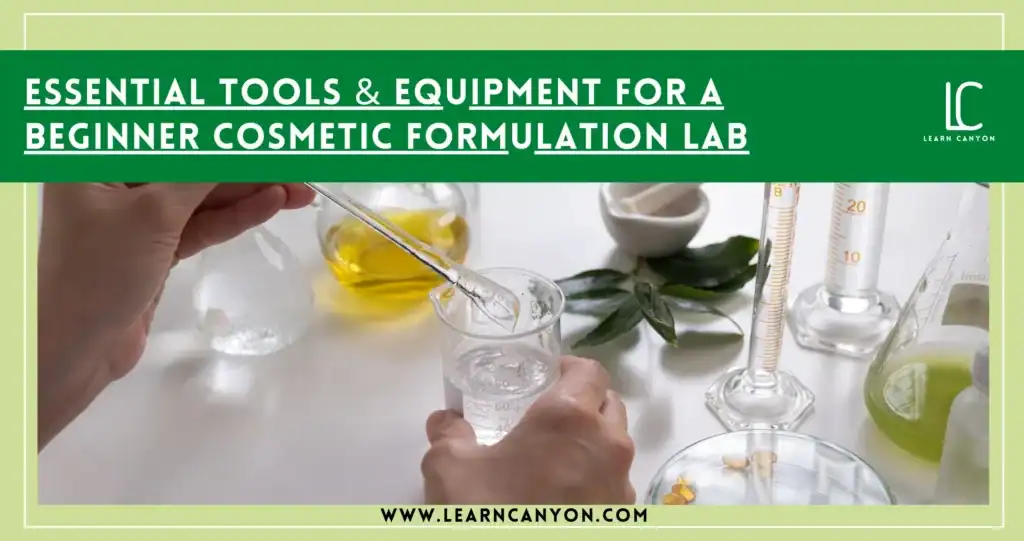

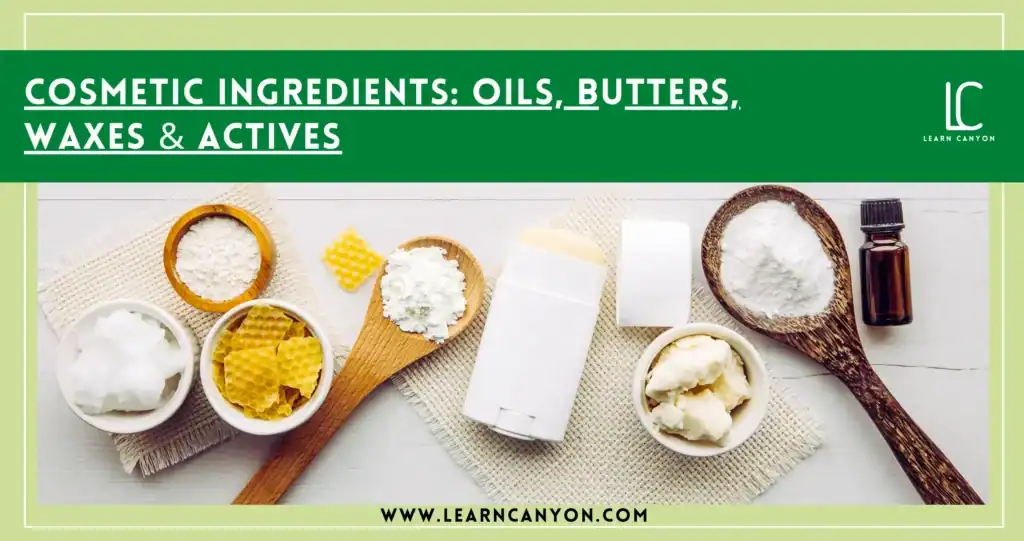



1 thought on “How Natural & Organic Certifications Impact Skincare Formulation”
This blog highlights the numerous benefits of using certified natural and organic skincare products, from healthier skin free of harsh chemicals to environmental sustainability. It’s great to see a focus on transparency and ethical sourcing, making it easier for consumers to make informed choices. The insights into common misconceptions are particularly helpful for those considering a switch to natural skincare. Overall, a fantastic resource for anyone looking to prioritize their skin health and the planet!